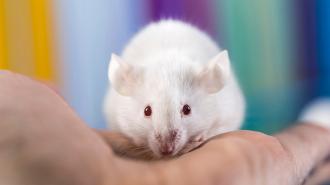A common HIV drug was able to improve memory linking in aging mice — suggesting that it might be able to help people experiencing age-related memory loss, too.
The challenge: Rather than storing all of our memories individually, our brains connect those that are related chronologically — when you recall a significant memory, that triggers you to then remember the related ones, too.
As we age, our brains get worse at memory linking — we might remember a face, but not the name associated with it, or know that we’ve heard something, but not be able to recall where we heard it.
“The drug duplicated the effect of genetically deleting CCR5 from the mices’ DNA.”
Alcino Silva
The background: Our bodies naturally produce a protein (called CCR5) that interferes with memory linking — this might seem like a bug, but it’s actually a feature.
“Life would be impossible if we remembered everything,” said UCLA researcher Alcino Silva. “We suspect that CCR5 enables the brain to connect meaningful experiences by filtering out insignificant details.”
From previous research, the UCLA team knew that the CCR5 gene expresses more of the protein as we get older, and that this increased expression interferes with memory linking.
What’s new? For a new study, Silva’s team boosted the expression of CCR5 in mice and deleted the CCR5 gene in others. It then used two cages to test the animals’ abilities to make memory connections between places and events.
The CCR5-boosted animals had trouble connecting memories between the two cages, while the mice without the CCR5 gene were better at linking memories than normal mice — this confirmed that manipulating CCR5 could improve or hinder memory linking.
“Once we fully understand how memory declines, we’ll possess the potential to slow down the process.”
Alcino Silva
For the next part of the study, the researchers gave mice the drug maraviroc, which the FDA approved for the treatment of HIV in 2007. Maraviroc blocks the receptor in brain cells that HIV uses to infect them and cause memory loss — which happens to be the same receptor CCR5 uses.
“When we gave maraviroc to older mice, the drug duplicated the effect of genetically deleting CCR5 from their DNA,” said Silva. “The older animals were able to link memories again.”
Looking ahead: The researchers think maraviroc might be able to improve memory linking in people who are experiencing memory loss in middle age, perhaps due to dementia. It might also improve memory in people who’ve had strokes, which are often followed by an increase in CCR5 expression.
“Our next step will be to organize a clinical trial to test maraviroc’s influence on early memory loss with the goal of early intervention,” said Silva. “Once we fully understand how memory declines, we’ll possess the potential to slow down the process.”
We’d love to hear from you! If you have a comment about this article or if you have a tip for a future Freethink story, please email us at [email protected].





